4 Healing Mushrooms for Holistic Health
Samuel Brooks on 26th Apr 2024To help commemorate Healing Day this year, we’ve compiled a list of 4 mushrooms that possess the power to heal physically, mentally and/or spiritually. Although there are many reports that promote the health benefits of these mushrooms, clinical trials have yet to be commenced on humans for most - so we implore all those in the scientific community to get with the program.
Relief with Reishi
Reishi ( Ganoderma Lingzhi) is one of the most famed and revered mushrooms in traditional Chinese medicine. It has been used for thousands of years to promote longevity and vitality.
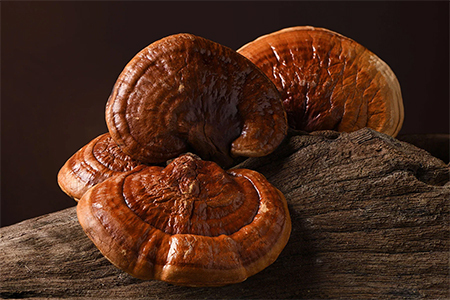
Considered an adaptogen, Reishi is a natural substance that helps the body adapt to stress. It is known to have calming effects, promoting relaxation and reducing anxiety. And as stress is the prequel to various diseases and ailments, controlling it can help to prevent numerous potential problems. Reishi also supports the immune system, enhances sleep quality and improves mental clarity. Clear to see why the Chinese call it the mushroom of immortality [1].
Why are Reishi mushrooms allegedly effective?
Reishi contains beta-glucans [2], which are complex sugars that stimulate the immune system. These compounds help increase the activity of white blood cells, providing enhanced protection against infections and diseases. Regular consumption of Reishi is thought to improve the body's resistance to common illnesses.
Potential benefits of Reishi mushrooms: stress, sleep, anxiety, depression, focus
Lion’s Mane: a boost to the brain
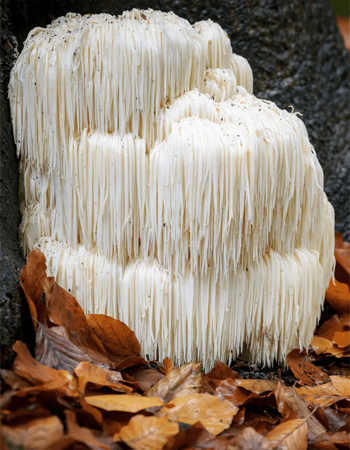
Lion's mane ( Hericium Erinaceus) is a unique-looking mushroom that resembles a lion's mane, hence the name. Chinese medicine has long used this mushroom to support the spleen, which is linked to digestion, energy levels, and water regulation in the body. But in recent years it has gained attention for its potential to support brain health and cognitive function.
It has been used in traditional medicine to improve memory and concentration [3], and emerging research supports its neuroprotective properties, exhibiting a tendency to defend against neurodegenerative diseases such as Alzheimer's and Parkinson's [4].
Studies have also suggested that it may even help regenerate damaged nerve cells which can help recovery times in those who have suffered stroke, and brain or spinal cord injuries [4]. Lion's Mane has also been touted to protect against ulcers in the digestive tract and reduce the risk of heart disease.
Why are Lion’s Mane mushrooms allegedly effective?
Lion's Mane contains compounds that stimulate the production of nerve growth factor (NGF) [3], a protein that is essential for the growth and maintenance of neurons. It is also thought to improve fat metabolism and lower triglyceride levels.
Potential benefits of Lion's Mane mushrooms: cognition, memory, focus, depression
Heart-felt healing with Shiitake
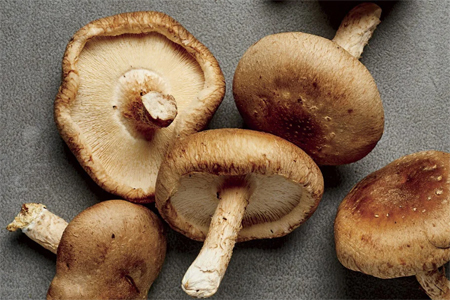
Shiitake ( Lentinula Edodes) is already a common ingredient in some of my favourite Asian dishes due to its rich flavour but it merits inclusion on its nutritional qualities that are particularly valuable to the heart. It also contains vitamin D helping to absorb calcium therefore promoting strong bones [5]. Other benefits include regulating blood sugar levels, nurturing a healthy inflammatory response and charging the immune system - one reason that Shiitake mushrooms are so diverse in the conditions that they have been used to treat.
Why are Shiitake mushrooms allegedly effective?
Eritadenine, a compound found in Shiitake mushrooms, has been found to help balance cholesterol levels [6]. Amounts of triglyceride have also been found to be much lower, reducing fat content, stabilising blood pressure, enhancing circulation and thereby further improving cardiovascular health. Other composites are present that can reportedly inhibit the growth of cancer cells.
Potential benefits of Shiitake mushrooms: heart, bones, immune system
Psilocybin Mushrooms (Magic Mushrooms)
We know that psilocybin mushrooms have been used for centuries in spiritual and religious ceremonies. They are believed to facilitate deep spiritual experiences and connections, leading to personal growth and transformation. Psilocybin's ability to open the mind to new perspectives makes it a viable tool for those seeking spiritual exploration and healing.
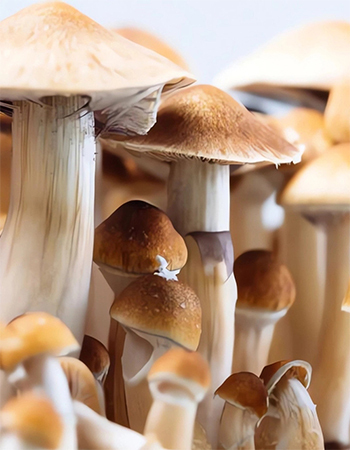
In the aftermath of the stigma and widespread fear of the 1970s, research has been significantly and unquestionably delayed [7]. But finally a rational consensus has emerged with recent studies to suggest that psilocybin (the psychoactive compound in ‘magic mushrooms’) can be effectively used in therapeutic settings to help individuals with mental health issues such as depression, anxiety, and PTSD [8]. Clinical trials have shown that these mushrooms may have lasting positive effects on mental health when used in controlled environments. Perhaps it is the overwhelming necessity that has motioned this revisit to psychedelics.
Interestingly and unsurprisingly, as a potent behaviour-alterer, small tests have been conducted to deduce the effectiveness of psilocybin mushrooms on treatments for various addictions (although clearly not enough). One such study on nicotine addiction showed that 80% of participants who received psilocybin therapy stopped smoking. Remarkably, 60% of those participants remained smoke-free 16 months later. This is a significant outcome, especially when compared to other therapies, which typically have a success rate of 35% or less [9].
There have also been indications that psilocybin may help with neurological disorders such as Alzheimer's but again - this has yet to be proven [10].
Why are Psilocybin mushrooms allegedly effective?
Once inside the body psilocybin quickly converts into psilocin, which interacts with serotonin receptors in the brain with varying effects. Most notably the Default Mode Network (DMN) experiences a significant decrease in activity whilst connections are forged with otherwise unfrequented areas. Wikipedia [11] states that:
[the DMN] relates more to introspection and one's sense of self.
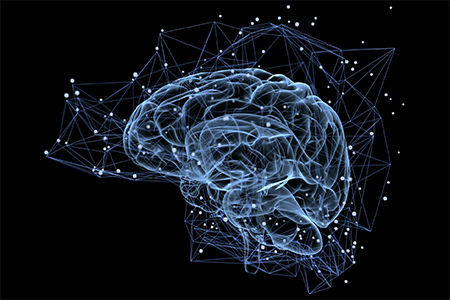
So the psilocin helps to establish different patterns of thought regarding self, which are those that perpetuate self-deprecating convictions, leading to depression and comparable conditions. Potentially the same reasons that support neuropsychological disorders such as addictive behaviours. Altering the path the mind takes by reconstructing the landscape of the brain seems like a logical step to recovery.
Potential benefits of Psilocybin mushrooms: depression, anxiety, PTSD, addiction, neurological disorders
Are there any other mushrooms that can heal?
There are so many health benefits to so many variations of mushrooms but amongst the most celebrated are:
- Turkey Tail (Coriolus Versicolor) is effective for fungal infections, Acquired Immunodeficiency Syndrome (AIDS), and as a complementary treatment for cancer [1].
- Chaga (Inonotus Obliquus) is thought to have anticancer properties and is high in antioxidants which reduces the damage caused by oxidation [12].
- Cordyceps (Ophiocordyceps Sinensis), believed to cause an increase in energy levels, immune cells, hormone regulatory properties (for both men and women) and lung capacity [6].
Please note: always consult a professional if taking medication or pregnant.
Healing Day FAQs
What is the origin of World Healing Day?
Unlike many annual events, World Healing Day didn’t originate from any one individual but as a grassroots movement. It has matured from World Tai Chi and Qigong Day, an event held on the last Saturday of April since 1999, to become a globally recognised celebration of the benefits of natural healing.
Historically what has been the significance of World Healing Day?
Over the past two decades there has been a greater focus within the mainstream towards well-being, helping to recognise the importance of our symbiotic relationships with the planet, ourselves and each other. For western countries, adopting these characteristics into our cultures is a positive.
How can I participate this Healing Day?
Happily there is lots going on around the globe this Saturday. You may want to join with others at a group event or perhaps catch-up with an old friend for a spa day. Or maybe you prefer to just connect with yourself alone in meditative thought.
References
1: Zaremba K (2022) Top 8 Medicinal Mushrooms For Immune Health. Available at: https://fullscript.com/blog/mushrooms-for-immune-health (Accessed 25 April 2024).
2: Dan L (2021) 2 Supplements You Didn’t Know To Use For Cold and Flu Season. Available at: https://fullscript.com/blog/supplements-for-cold-and-flu (Accessed 23 March 2024).
3: La Forge T (2020) 6 Mushrooms That Act as Turbo-Shots for Your Immune System. Available at: https://www.healthline.com/health/food-nutrition/best-medicinal-mushrooms-to-try (Accessed 23 April 2024).
4: Julson E (2024) 9 Health Benefits of Lion’s Mane Mushroom (Plus Side Effects). Available at: https://www.healthline.com/nutrition/lions-mane-mushroom (Accessed 23 April 2024).
5: Erickson K (2020) 5 Health Benefits of Shiitake Mushrooms. Available at: https://fullscript.com/blog/shiitake-mushroom-benefits (Accessed 20 April 2024).
6: Real Mushrooms (2022) Medicinal Mushrooms: 7 Kinds and Their Unique Health Benefits. Available at: https://www.realmushrooms.com/7-medicinal-mushroom-benefits-for-health/ (Accessed 20 April 2024).
7: Lowe H, Toyang N, Steele B, Valentine H, Grant J, Ali A, Ngwa W and Gordon L (2021) The Therapeutic Potential of Psilocybin. Available at: https://www.ncbi.nlm.nih.gov/pmc/articles/PMC8156539/ (Accessed 25 April 2024).
8: Mammoser G (2019) Mushrooms as Medicine? Psychedelics May Be Next Breakthrough Treatment. Available at: https://www.healthline.com/health-news/benefits-of-medical-mushrooms (Accessed 20 April 2024).
9: Gorrell C (2021) Tell Me All I Need to Know about Psilocybin (Magic Mushrooms). Available at: https://www.psycom.net/psilocybin-magic-mushrooms (Accessed 21 April 2024).
10: Vann Jones S. A, O’Kelly A (2020) Psychedelics as a Treatment for Alzheimer’s Disease Dementia. Available at: https://www.ncbi.nlm.nih.gov/pmc/articles/PMC7472664/ (Accessed 22 April 2024).
11: Wikipedia (2004) Psilocybin. Available at: https://en.wikipedia.org/wiki/Psilocybin (Accessed 22 April 2024).
12: Géry A, Dubreule C, André V, Rioult J.P, Bouchart V, Heutte N, Eldin de Pécoulas P, Krivomaz T and Garon D (2022) Chaga (Inonotus obliquus), a Future Potential Medicinal Fungus in Oncology? A Chemical Study and a Comparison of the Cytotoxicity Against Human Lung Adenocarcinoma Cells (A549) and Human Bronchial Epithelial Cells (BEAS-2B). Available at: https://www.ncbi.nlm.nih.gov/pmc/articles/PMC6142110/ (Accessed 25 April 2024).

